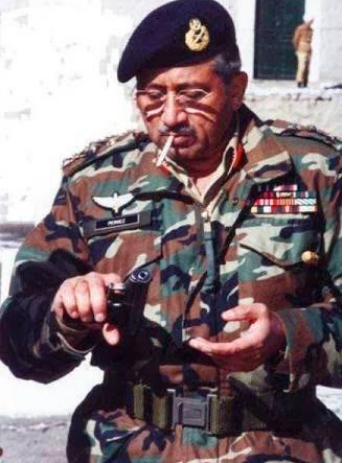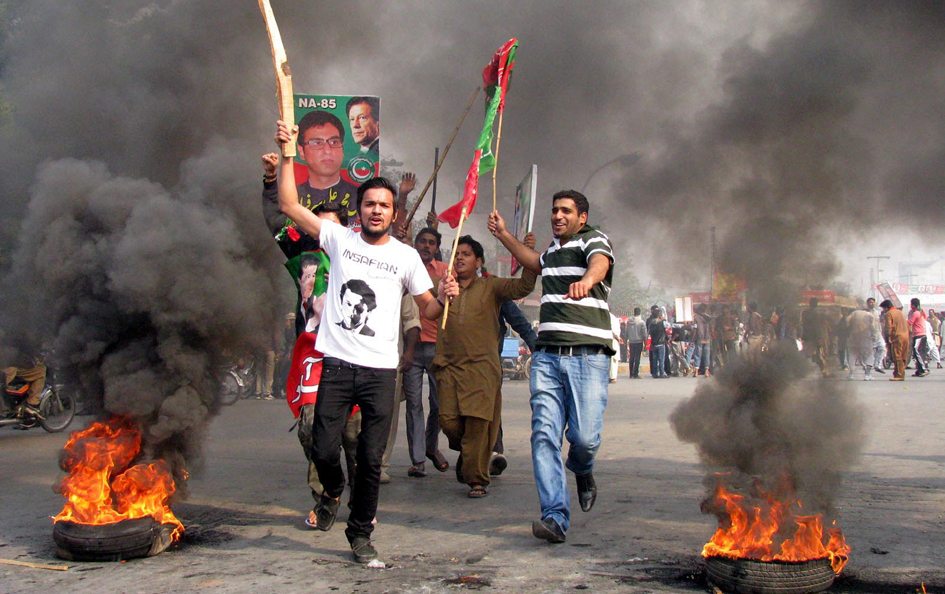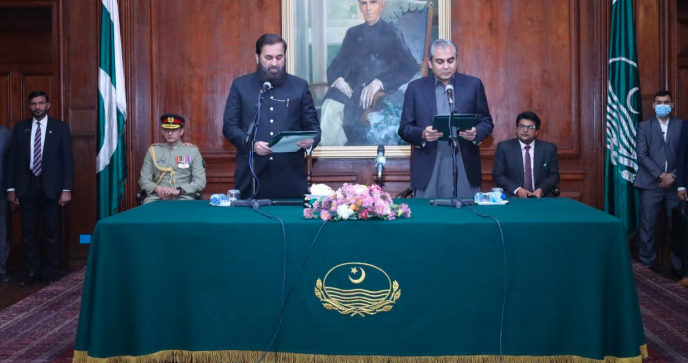After being ousted from power in April last year through a no-confidence motion, Imran Khan has been frantically trying to come back into power one way or the other. When all else failed, in January, Pakistan Tehreek-e-Insaf dissolved Punjab and Khyber Pakhtunkhwa assemblies where it was in power, to force the government to hold country-wide elections. However, it is not a simple affair and the country’s security and economic situation calls for some deep thinking. One also needs to look at Pakistan’s checkered history, where Pakistan Muslim League-Nawaz (PML-N) was elected by the people of Pakistan with a thumping majority to streamline the country’s affairs but was rooted out through a conspiracy once it no longer suited the powers that be.
 In 1997 when Mian Nawaz Sharif came into power by winning a two-thirds majority in parliament, our biggest challenge was to avert an economic crisis, which was exacerbated by international economic sanctions following Pakistan’s decision to conduct nuclear tests in response to India’s provocations. The PML-N not only overcame this crisis, but it was also able to deal with India on equal footing after demonstrating its nuclear capabilities and presenting a strong economic roadmap, which led to Indian Prime Minister Atal Bihari Vajpaee’s visit to Lahore in February 1999, which boded well for the country’s future. However, then Chief of Army Staff General Musharraf carried out a clandestine operation in Kargil later that summer, sabotaging relations with India and causing immense humiliation and economic adversity to the country. To cover his tracks, General Musharraf took over the civilian government through a coup in October 1999, imposing direct military rule, and later exiling Mian Nawaz Sharif along with his family.
In 1997 when Mian Nawaz Sharif came into power by winning a two-thirds majority in parliament, our biggest challenge was to avert an economic crisis, which was exacerbated by international economic sanctions following Pakistan’s decision to conduct nuclear tests in response to India’s provocations. The PML-N not only overcame this crisis, but it was also able to deal with India on equal footing after demonstrating its nuclear capabilities and presenting a strong economic roadmap, which led to Indian Prime Minister Atal Bihari Vajpaee’s visit to Lahore in February 1999, which boded well for the country’s future. However, then Chief of Army Staff General Musharraf carried out a clandestine operation in Kargil later that summer, sabotaging relations with India and causing immense humiliation and economic adversity to the country. To cover his tracks, General Musharraf took over the civilian government through a coup in October 1999, imposing direct military rule, and later exiling Mian Nawaz Sharif along with his family.
After the nine-year-long dictatorship could no longer be sustained in the face of a movement for the restoration of democracy led by Mian Nawaz Sharif and Benazir Bhutto, General Musharraf had to relent and allow the Sharif family back into the country to participate in the 2008 general elections. After forming the government in Punjab in 2008, the PML-N proved its competence through province-wide development and reforms under the able leadership of Shehbaz Sharif, which paved the way for its success in the 2013 general election. While the PPP government carried out important legislative and constitutional reforms at the centre from 2008 to 2013, it could not address the energy crisis or reform the economy. It was a time when the country was grappling with rampant terrorism and a war was going on next door in Afghanistan. By 2013, the national exchequer was almost empty and international financial institutions forecast that the country would default in about two months.
In such bleak circumstances, it was PML-N that brought the country back on its feet by formulating a strong economic policy which proved successful by bringing foreign investment from the UK, China, Germany, Japan, and Turkey, the most notable being the $46 billion investment for the China-Pakistan Economic Corridor (CPEC). Our government tackled the energy crisis head-on and doubled the number of power plants in the country in just five years from 2013 to 2018. The government initiated and completed a number of infrastructure development projects and modernized health and education sectors at both the centre and Punjab. These achievements were lauded internationally. For the first time in its history, Pakistan completed an International Monetary Fund (IMF) programme and its standing improved progressively on Transparency International’s Corruption Perception Index from 127 in 2013 to 117 in 2018.

It is unfortunate that instead of protecting the constitution and discharging their responsibilities within the parameters of the oath they took, certain individuals within the institutions sustained the long tradition of meddling in politics.
Unlike the unconstitutional government of Pervez Musharraf, the PML-N derived its power from the people and the people had given it the mandate to rule at both the centre and Punjab and be part of the coalition government in Balochistan. With the crises averted, Pakistan was at a level where the government could take important policy decisions. The PML-N gained the insights and confidence to call for major reforms to align Pakistan’s foreign policy with its long-term economic goals. This caused friction with the establishment which had so far held sway over certain areas of foreign policy. Also, Mian Nawaz Sharif’s popularity rankled with some quarters, who tried to curtail his influence by creating political instability in the country. That was the beginning of the country’s descent into where it finds itself today.
First, then opposition leader Imran Khan refused to accept the 2013 election results with mala fide intent and started months-long sit-in protests outside the parliament building in Islamabad. It is public knowledge that certain individuals in our institutions backed Imran Khan’s protests which created an environment of political uncertainty. Later, when Panama Papers were leaked, certain power centres colluded to oust Mian Nawaz Sharif from office despite his own name not appearing in the leaks.
That same year, the friction between the PML-N government and the military establishment came to a head when Dawn newspaper published a news report in which it claimed that the government had delivered a firm message to the military to take action against militant outfits as Pakistan faced international isolation. Instead of listening to the government and acting on these concerns, there was a huge uproar on the publication of this news that resulted in the removal of Pervez Rashid, federal information minister, Tariq Fatemi, special assistant to the prime minister on foreign affairs, and Rao Tehseen, principal information officer, for leaking information to the newspaper and for failure to block the publication of the news. Despite these setbacks, the government continued to push ahead and claim its right to decision-making. However, it did not last long.
In a case on Panama Papers, Mian Nawaz Sharif was disqualified from holding the office of the prime minister in July 2017 for not taking his salary from his son during his exile in Saudi Arabia when the Sharif family started a business abroad. A number of fake cases were instituted against Mian Nawaz Sharif and later, in December 2018, he was sentenced to a seven years jail term and fined $25 million by an anti-corruption court. The accountability judge, Muhammad Arshad Malik, later admitted that he was pressured to convict Nawaz Sharif in this case. While the judge was unceremoniously dismissed from service after this admission, his decision was not quashed by the Supreme Court.

The Sharif family built their wealth through legitimate businesses and could have progressed like the Tatas and Birlas of India and built a sound industrial base for Pakistan, but their factories were closed, properties confiscated, and they were forced into exile or imprisoned time and again. A false narrative of corruption has been spread against them to protect the real criminals.
It is unfortunate that instead of protecting the constitution and discharging their responsibilities within the parameters of the oath they took, certain individuals within the institutions sustained the long tradition of meddling in politics.
In 2018, the general election was heavily rigged before, during, and after polling to give PTI an advantage. In support of PTI, massive propaganda machinery was instituted to discredit certain parties and politicians, and many young voters were misguided and their minds polluted through coordinated social media campaigns. Military personnel were deputed inside the polling stations and Results Transmission System (RTS) was disrupted to stop the transmission of results from selected constituencies to change results. Even with massive support, the PTI could not win a majority and was forced to form a coalition at the centre and in Punjab, where PML-N had a plurality of votes. Thus a competent government was derailed and replaced with an inexperienced party, led by an inept leader who proved in his almost four years in power that he was not only incompetent but highly corrupt too.
The Sharif family built their wealth through legitimate businesses and could have progressed like the Tatas and Birlas of India and built a sound industrial base for Pakistan, but their factories were closed, properties confiscated, and they were forced into exile or imprisoned time and again. Despite all that, they managed to survive and thrive. However, a false narrative of corruption has been spread against them to protect the real criminals.
Imran Khan was brought to power with the understanding that the PML-N would be completely wiped off. It was only when the country’s economic and social indicators started declining and the situation became alarming that the characters who had brought the PTI to power started having second thoughts about their experiment.
In these circumstances, the opposition teamed up to show Imran Khan the door through a constitutional process of a vote of no-confidence and formed a coalition government led by PML-N to save Pakistan from irreparable damage. However, the mess created by Imran Khan over almost four years cannot be cleaned up overnight. His government practically handed over control of the State Bank of Pakistan (SBP) to the IMF by bulldozing a law regarding the purported autonomy of the SBP through parliament, which amounted to an economic surrender. His government agreed with the IMF to revive its loan facility in 2022, signing a very hard agreement and then reneging on it, creating immense problems for the current government. It will take some time to fix these issues and bring stability.
In the meanwhile, Imran Khan and his cronies have continued to spread false narratives. After being removed from office through constitutional means, he claimed to be a victim of a foreign conspiracy but had to backtrack from this position when he could not muster any evidence. Similarly in 2017, he had claimed that a close associate of then Chief Minister of Punjab Shehbaz Sharif had offered him Rs10 billion in exchange for withdrawing the Panama Papers case, yet failed to present any evidence in court when slapped with a defamation suit by the former. After resigning en masse from parliament, PTI members had no qualms about taking their salaries and enjoying their perks and privileges for nearly a year until their resignations were accepted.

Imran Khan dissolved PTI governments in two provinces in order to destabilize the country. Instead of parliamentary politics, he has always chosen the path of chaos, civil disobedience, incitement against the institutions, and maligning the country at international forums. This is what he will continue to do after the elections.
The coalition-based Pakistan Democratic Movement (PDM) government is committed to fixing the wrongs done by the PTI government and holding those responsible accountable. We must think carefully if conducting elections at a time when the country is grappling with grave economic and security challenges is even feasible. When the threat of default is looming over our heads and terrorists can breach the most secure areas, holding a general election costing Rs60 billion to satisfy the ego of someone like Imran Khan may not be in the best interest of our motherland.








